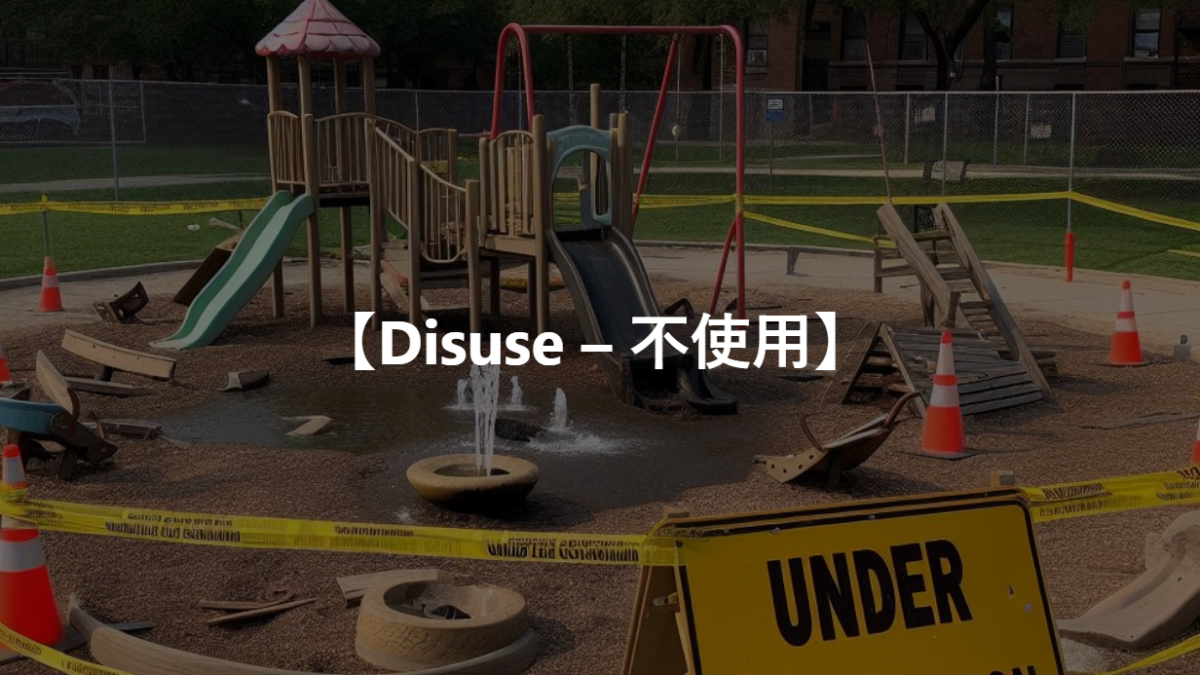【Disuse – 不使用】という単語の語源とか由来を知っていますか?
この単語は中英語から来ており、「dis-」(反対の、分離の)と「use」(使用)の組み合わせに由来しています。元々の意味は「使用しないこと」や「使われなくなること」で、何かが長期間使われない状態を指していました。
「Disuse」は、何かが一般的に使用されなくなったり、慣れ親しまれた用途から離れたりする状況を表現するのに用いられます。例えば、技術や言語、概念が時代遅れになり、もはや使用されなくなった場合などに使われることがあります。現代英語においても、この単語は「使用されなくなること」や「使われない状態」を指すのに使われています。
この単語の類義語・反対語を教えてください。
類義語:
- Neglect – 無視、放置。
- Abandonment – 放棄。
- Desuetude – 廃れ、使われなくなること。
- Obsolescence – 時代遅れ、陳腐化。
- Discontinuation – 中止、断念。
反対語:
- Use – 使用。
- Utilization – 利用。
- Employment – 雇用、利用。
- Application – 応用、適用。
- Activation – 活性化、稼働。
この単語に似た単語で間違いやすい単語はありますか?
- 「Misuse」も名詞で、「誤用」や「悪用」という意味です。何かが不適切または不正な方法で使用されることを指します。
この単語を使った例文を5つほど教えてください。
- The old factory was left to fall into disuse as new technologies took over. (新しい技術が導入されるにつれて、古い工場は不使用のまま放置されました。)
- The disuse of traditional farming methods has led to a decline in agricultural productivity. (伝統的な農業方法の不使用が、農業生産性の低下につながっています。)
- The park fell into disuse after the local government cut its maintenance budget. (地方自治体がメンテナンス予算を削減したため、その公園は不使用となりました。)
- The language was in danger of falling into disuse before efforts were made to revitalize it. (その言語は再活性化の努力がなされる前に、不使用に陥る危険にさらされていました。)
- The disuse of public transportation options has led to increased traffic congestion in the city. (公共交通手段の不使用が、都市の交通渋滞の増加につながっています。)
【Disuse – 不使用】のコロケーション
- Fall into Disuse(使われなくなる): 何かが時間が経つにつれて使用されなくなる様子。
- State of Disuse(不使用の状態): 何かが長期間使用されていない状態。
- Disuse of Technology(技術の不使用): 新しい技術の出現により古い技術が使用されなくなること。
- Disuse and Decay(不使用と衰退): 長期間使われないことによって物が劣化または機能しなくなる状況。
- Due to Disuse(不使用のため): 何かが使われなくなった結果生じる状況や影響。
Grammar Questions
1) Select the correct word to complete the sentence:
“The old factory fell into __ after the company relocated its operations overseas.”
- A) prosperity
- B) disuse
- C) development
- D) expansion 解答と解説
正解: (B) disuse
文脈から判断して、空欄には「不使用」という意味の語句が入るのが適切です。
和訳: 会社が海外に移転した後、その古い工場は不使用に陥りました。
解説: 「disuse」は、以前使用されていたものが使われなくなることを意味します。
2) Which word best completes the sentence?
“Many ancient languages have fallen into __ over the centuries.”
- A) revival
- B) disuse
- C) popularity
- D) growth 解答と解説
正解: (B) disuse
文脈から判断して、空欄には「不使用」という意味の語句が入るのが適切です。
和訳: 多くの古代言語は、何世紀にもわたって不使用に陥っています。
解説: 「disuse」は、文化や歴史の中で使用されなくなった言語を指します。
3) Choose the word that fits best in the sentence:
“The garden tools were covered in rust due to years of __.”
- A) maintenance
- B) disuse
- C) repair
- D) cleaning 解答と解説
正解: (B) disuse
文脈から判断して、空欄には「不使用」という意味の語句が入るのが適切です。
和訳: 長年の不使用のために、庭用具は錆びで覆われていました。
解説: 「disuse」は、長期間使用されなかったことによる状態を示します。
4) Select the correct word to fill in the blank:
“Technological advancements have led to the __ of many traditional crafts.”
- A) revival
- B) flourishing
- C) disuse
- D) preservation 解答と解説
正解: (C) disuse
文脈から判断して、空欄には「不使用」という意味の語句が入るのが適切です。
和訳: 技術の進歩により、多くの伝統工芸が不使用に追い込まれました。
解説: 「disuse」は、技術や時代の変化によって利用されなくなった技術を指します。
5) Which word should complete the sentence?
“The bicycle was in good condition despite its long period of __.”
- A) renovation
- B) disuse
- C) activity
- D) operation 解答と解説
正解: (B) disuse
文脈から判断して、空欄には「不使用」という意味の語句が入るのが適切です。
和訳: その自転車は、長期間の不使用にもかかわらず良好な状態でした。
解説: 「disuse」は、使用されていない期間を示しますが、その間に損傷が少なかったことを表します。

